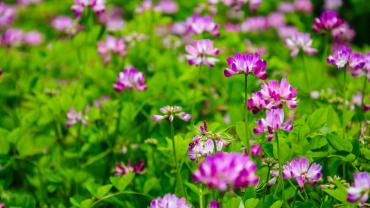
For more than 2,000 years, astragalus (Astragalus membranaceus) has been considered to be one of the most important and widely used adaptogenic herbs in traditional Chinese medicine. More than 100 compounds in astragalus have been identified to hold clinical significance in vivo or in vitro, including flavonoids, saponins, polysaccharides, and amino acids. Today, astragalus is one of the most popular herbal remedies worldwide for supporting liver health, respiratory health, blood sugar regulation, and exhibiting anti-inflammatory and antioxidant properties. The popularity of astragalus also stems from its well-researched immunomodulatory properties.
In vivo and in vitro studies suggest that astragalus has different effects on cytokine production under different conditions. Under normal conditions, astragalus may promote cytokine production and enhance immunity. During an inflammatory response, astragalus may reduce inflammatory response factors and promote cell protection. This immune balance is crucial for healthy aging. Aging is defined as the progressive decline of various physiological pathways, including immune function. Although further research is needed, astragalus has been suggested to promote healthy aging through its immunomodulatory properties.
Astragalus extracts have been shown to promote functions in both innate and acquired immune responses through various mechanisms. For instance, human and animal in vitro studies have demonstrated its abilities to induce monocyte activation, attenuate cytokine production, stimulate Tcell mitosis, increase antibody response and lymphocyte development, activate human CD4+ and CD8+ T cells, and regulate the balance of T-helper (Th)1/Th2 cytokines. Additionally, in the immunosuppressed mice, astragalus preparations promoted natural killer cell activity and improved Blymphocyte proliferation.
Astragalus may notably promote immune health in athletes. It is well known that moderate physical activity promotes a healthy immune system. In contrast, strenuous exercise may activate immune responses similar to those during chronic stress, trauma, or sepsis and may result in a Th1/Th2 response imbalance. Human studies reveal that athletes subjected to extended exhaustive exercise may be prone to shifting into a Th2-related response that may be associated with an increased risk of eczema and upper respiratory tract infections. A double-blind clinical study set out to examine the immunomodulatory impact of astragalus supplementation on 18 male members of the Polish rowing team undergoing rigorous physical exercise.
After 6 weeks of intensive training camp, the athletes that received 500 mg of astragalus root extract per day displayed enhanced immunological balance through stabilization of NK and Treg cells, and restored the Th1/Th2 balance toward a Th1 response when compared to a placebo. Previous studies have displayed the adaptogenic benefits of astragalus in supporting athletic endurance performance as well.
Astragalus has been used since the 1800s to promote immune health, which plays a critical role in the health and quality of life throughout a person’s life. Therefore, the immunomodulatory properties of astragalus alone or in combination with other herbs may potentially promote overall health and healthy aging.
By Danielle Moyer, MS, CNS, LDN